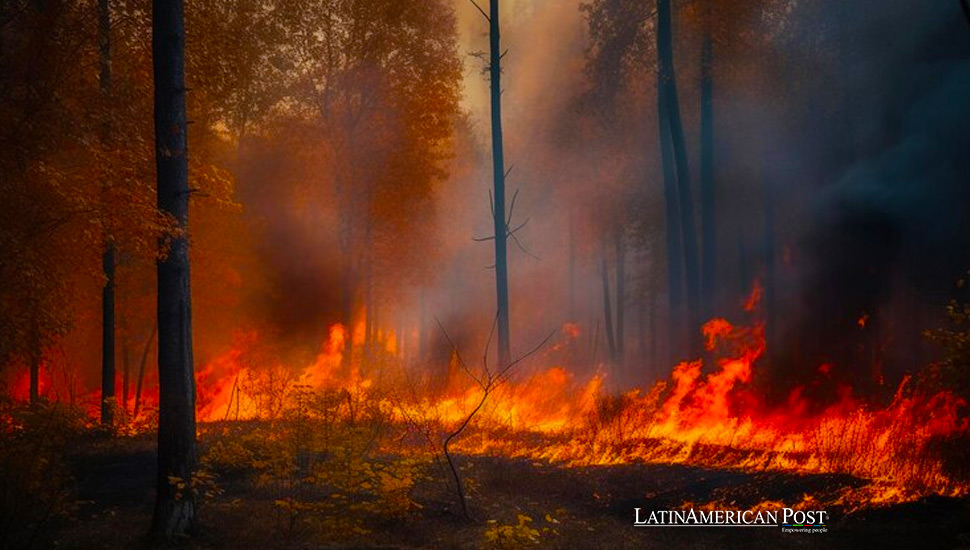Venezuela’s Wildfire Crisis: Latest to Hit Latin American Countries

Venezuela faces an unprecedented wildfire emergency, with over 30,200 blazes detected early this year, signaling a severe climate-induced challenge. This crisis echoes across Latin America, underscoring the urgent need for regional collaboration in combating climate change and its escalating impacts.
Venezuela is confronting a dire environmental crisis, with a record-breaking number of wildfires ravaging the nation. Data from Brazil’s National Institute for Space Research (Inpe) reveals that over 30,200 fires were detected across Venezuela from January to March, marking the highest tally since record-keeping began in 1999. This alarming surge in wildfires, engulfing the Amazon and other forested and grassland areas, underscores a broader climatic emergency gripping the region.
Multiple Factors Driving the Crisis
The driving forces behind this surge are manifold, with climate change-induced drought playing a pivotal role. High temperatures and low rainfall in northern South America have created a tinderbox, exacerbated by human activities such as land clearing for agriculture. El Niño, characterized by natural warming in the eastern Pacific, also contributes to these altered weather patterns, fueling the fire crisis.
Venezuela’s current plight could presage similar or worse conditions across Latin America, particularly in Brazil’s Amazon, where fires peak during the dry months of August and September, often due to deforestation for agricultural expansion.
In Venezuela, the battle against the flames has been particularly intense in areas like Henri Pittier National Park, known for its unique cloud forests and biodiversity. Residents and the National Park Service have expressed shock and alarm at the scale and intensity of the fires threatening this ecological gem.
Further south, in Venezuela’s Amazon region, the situation is equally grim. NASA data indicates 5,690 active fires, contributing to over half of all Amazonian fires across nine countries. The smoke from these fires has enveloped Guayana City, Venezuela’s largest urban center in the Amazon, impacting air quality and visibility.
Regional Implications and Collaborative Solutions
The crisis extends beyond Venezuela’s borders, affecting neighboring areas like Brazil’s Roraima state, where indigenous reserves face similar fire threats. The region’s significantly reduced rainfall, only 10% to 25% of normal levels in recent months, underscores the broader climatic shifts threatening the Amazon and its inhabitants.
The Amazon drought has had profound ecological and social impacts, from record-low river levels affecting transportation and livelihoods to the loss of wildlife, including endangered dolphins. These conditions disrupt local economies and ecosystems and contribute to the global climate crisis through increased greenhouse gas emissions from the fires.
Despite the growing body of evidence and the clear signals of escalating climate risk, the response from governments in the region, including Venezuela, has been criticized as inadequate. Experts like José Rafael Lozada, a forestry engineer, point out that while using fire for land clearing is longstanding, the exacerbated drought conditions have turned routine burns into large-scale disasters.
The need for a robust governmental response in Venezuela and Latin America highlights a gap in proactive and preventive fire management strategies. Recommendations include banning fires during dry spells, improving targeted responses to extinguish fires swiftly before they spread, and investing in permanent firefighting forces rather than relying on temporary solutions.
Regional Collaboration for Climate Resilience
The Venezuelan wildfire crisis is a clarion call for Latin America to address the intertwined challenges of climate change, land management, and disaster preparedness. As the region faces increasing environmental and climatic pressures, the need for comprehensive, collaborative, and long-term strategies to combat these threats and protect vulnerable ecosystems and communities has never been more urgent.
Also read: Venezuela’s Latest Political Turmoil is a Mockery of Democratic Ideals
Venezuela’s record wildfires represent a microcosm of Latin America’s larger environmental and climatic challenge. These fires’ escalating frequency and intensity, driven by climate change and exacerbated by human activities, demand a concerted and unified regional response. Only through collective action, innovative policy-making, and sustained commitment to environmental stewardship can Latin America hope to mitigate the impacts of climate change and safeguard its natural heritage for future generations.




